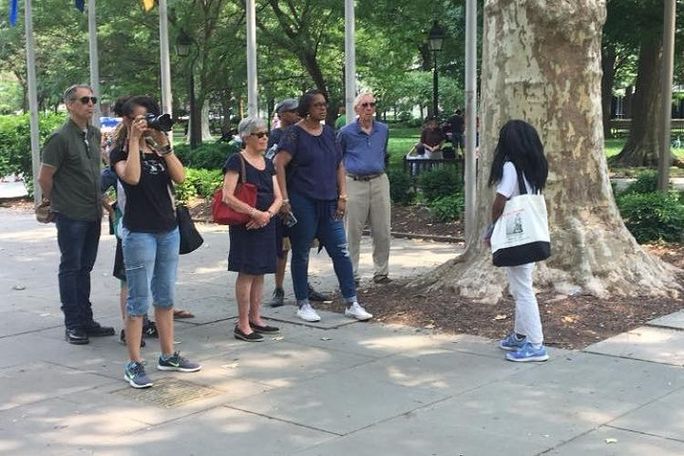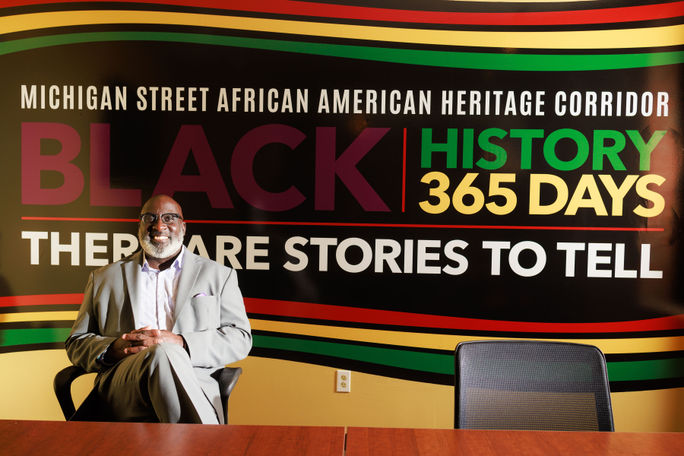A
walking tour is one of the most enriching travel experiences. It can retrace
the steps of famous history makers, include stops at local restaurants, and
provide the little-known history of museums or landmarks. Another perk? Walking
tours are often accompanied by expert tour guides who are available to answer
real-time questions. And for these Black-owned tour companies, walking tours
also serve the mission of showcasing and preserving Black history.
Raina
Yancey founded The Black Journey: Black History Walking
Tour in 2019. The
tour company provides four tours around Philadelphia's Black history landmarks,
and Yancey credits her mother with inspiring her love of history.
��My
mother, Dr. Victoria Ward Yancey, was a park ranger at Independence Hall National Historical
Park when I was
growing up,�� she says. ��I would accompany my mother to work on holidays and run
around the park behind the scenes, absorbing all the history like a sponge,
which is where I developed my passion for history.��?
Philadelphia
is one of the most historically significant cities in America, and through her
tours, Yancy hopes to spotlight the city's often-overlooked Black history.
��It��s
important to share Philadelphia��s Black history with travelers from all over
the world because our history is significant to the foundation of this nation,��
she explains. ��Often, these stories are not told in traditional educational
settings, so we feel we have a duty to share stories about these incredible
individuals and events.��?
Yancey
says that travelers booking tours can expect to hear engaging stories about the
Underground Railroad, abolitionists who risked their lives, and enslaved
Africans who survived the horrific journey of the Middle Passage. Ultimately,
Yancey says the most rewarding part of giving tours is ��meeting visitors from
around the world and sharing new information that even lifelong Philadelphians
might not have heard of.��

The Black Journey: Black History Walking Tour. (Photo Credit: The Black Journey)
In
Miami, Tap Tap Tours is also on a mission to spotlight
Black history and culture, especially from Miami��s Haitian community. Jean
Cidelca has been leading tours for eight years and says that sharing Black
history with travelers is important because ��Black history is human history.��
Some of the
company��s most popular tours are the La Perle De Miami Little Haiti Tour,?the Overtown
Home Tour includes stops in Miami's Historically Black Overtown neighborhood,
and the Revolution Tour teaches about pioneers of The Haitian Revolution.
"It was
important for us to create these walking tours in Miami to educate people, but
also to connect locals to their roots and culture,�� Cidelca says. ��Though we
have some tours with set itineraries, we can also create a customized
experience based on the individual's interest.��
Cidelca says
it��s rewarding when people say they learned a lot on the tours, but his tours
go beyond education and have brought families together.?
��We had a really
memorable moment on a recent tour,�� he says. ��We conducted a tour for a family
that adopted two kids from Haiti. The parents came from Argentina to Miami to
educate their children about their birth country and Haitian culture.��?

Terry Alford, Executive Director, Michigan Street African American Heritage Corridor. (Photo Credit: Stephen Grabis)
In Buffalo, New
York, the Michigan Street African American
Heritage Corridor has
been offering walking tours of the neighborhood for four years. The tours share
Buffalo��s African American history, which dates back to the 1830s and
includes an Underground Railroad stop. Executive
Director Terry Alford says the tours became necessary when several of the
neighborhood's historic sites closed during the pandemic, and visitors were
still eager to learn about the area��s Black history.?
��Developing walking tours allowed the Corridor to
share stories of people and places that extend beyond the four remaining
historic sites (Michigan Street Baptist Church, Nash House
Museum, Historic Colored Music Club, and WUFO Black Radio History Collective),�� Alford explains.
��Through these tours, we are able to tell important stories, like that of John
E. Brent, Buffalo��s first African American architect and designer of the
Michigan Street YMCA.��
Travelers can sign up for 45-minute walking tours
that include the four historic sites and a background of the neighborhood's
history to its present state. Alford��s vision for the current neighborhood is
to attract developers to build a ��thriving Black-business district where visitors and residents can live,
work, and play.��
Audrey Clark,
the program��s Curator of Exhibits and Interpretive Programming, says that
sharing Buffalo��s Black history with travelers highlights the often
unrepresented part of the city��s identity and honors the struggles and
achievements of past generations.?
��This history
fosters a sense of connection and respect among visitors, allowing them to see
Buffalo not just as a destination but as a place where Black agency,
creativity, and resilience have left an indelible mark,�� Clark says. ��By
promoting this history, we inspire future generations to appreciate the
importance of inclusivity, social justice, and community empowerment. The
Michigan Street African American Heritage Corridor serves as a living testament
to the power of Black history and its ongoing relevance today, making Buffalo��s
story one that all travelers should experience.��
For the latest travel news, updates and deals, subscribe to the daily TravelPulse newsletter.
Topics From This Article to Explore